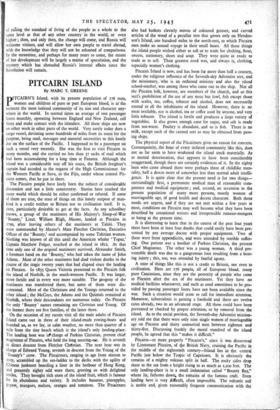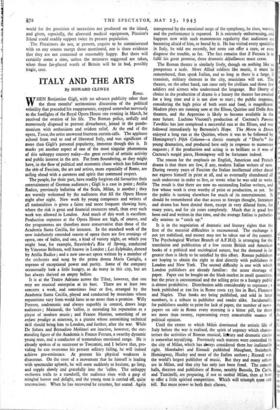PITCAIRN ISLAND
By MARC T. GREENE
PITCAIRN'S Island, with its present population of 176 men, women and children of pure or part European blood, is at the moment the most isolated community of its size and character any- where in the world. In normal times an average of two passenger liners monthly, operating between England and New Zealand, call there and make contact with the islanders. All these ships are now on other work in other parts of the world. Very rarely today does a cargo vessel, deviating some hundreds of miles from its route for the purpose, bring mail, messages and material necessities to this lonely dot on the surface of the Pacific. I happened to be a passenger on such a vessel very recently. She was the first to visit Pitcairn in many months, and she carried no less than 37 sacks of mail which had been accumulating for a long time at Panama. Although the island was a considerable way off his route, the British freighter's captain had acceded to the request of the High Commissioner for the Western Pacific at Suva, in the Fijis, under whose control Pit- cairn comes, that he put in there.
The Pitcairn people have lately been the subject of considerable discussion and not a little controversy. Stories have reached the outer world which should be either confirmed or refuted. If some of them are true, the state of things on this lonely outpost of man- kind is a credit neither to Britain nor to civilisation itself. It is, then, particularly desirable to get at the facts. As any schoolboy knows, a group of the mutineers of His Majesty's Sloop-of-War 'Bounty,' Lieut. William Bligh, Master, landed at Pitcairn in 1790, after leaving others of the mutineers at Tahiti. They were commanded by Master's Mate Fletcher Christian, Executive Officer of the 'Bounty,' and accompanied by some Tahitian women. Nothing was known of all this until the American whaler 'Topaz,' Captain Matthew Folger, touched at the island in 1812. At that time only one of the original mutineers survived, Alexander Smith, a foremast hand on the Bounty,' who had taken the name of John Adams. Most of the other mutineers had died violent deaths in the course of the tragic twenty years that had elapsed since the landing on Pitcairn. In 1855 Queen Victoria presented to the Pitcairn folk the island of Norfolk, in the south-western Pacific. It was larger, more fertile and in every way more suitable. The progeny of the mutineers was transferred there, but some of them were dis- contented. Most of the Christians and the Youngs returned to the other island ; the McCoys, the Adams and the Quintals remained at Norfolk, where their descendants are numerous today. On Pitcairn the only `Bounty' names remaining are Christian and Young. Of the former there are five families, of the latter three.
On the occasion of my recent visit all the male adults of Pitcairn Island came out in three of their island-made rowing-boats and boarded us, as we lay, in calm weather, no more than quarter of a mile from the tiny beach which is the island's only landing-place. The leading boat was Ur charge of Parkins Christian, present chief magistrate of Pitcairn, whO held the long steering-oar. He is seventh in direct descent from Fletcher Christian. The next boat was in charge of Edward Young, seventh in descent from the Young of the 'Bounty's ' crew. The Pitcairners, ranging in age from sixteen to sixty, scrambled up the sea-ladder to the decks with the agility of Chinese junkmen boarding a liner in the harbour of Hong Kong, and presently eighty odd were there, greeting us with delighted smiles. They brought rich store of the island fruit, which is famous for its abundance and variety. It includes bananas, pineapples, Papaw, mangoes, melons, oranges and tomatoes. The Pitcairners
also had baskets cleverly woven of coloured grasses, and carved articles of the wood of a peculiar tree that grows only on Hender- son's Island, one hundred miles to the north-east, to which Pitcairn men make an annual voyage in their small boats. All these things the island people wished either to sell or to trade for clothing, flour, sweets, stationery, shoes and soap. They were quite as ready to trade as to sell. Their greatest need was, and always is, clothing. especially women's clothing.
Pitcairn Island is now, and has. been for more than half a century, under the religious influence of the Seventh-day Adventist sect, and the missionary, who is an ordained minister and also the island school-teacher, was among those who came out to the ship. Not all the Pitcairn folk, however, are members of the church, and so this sect's prohibition of the use of any meat but fowl, fish except those with scales, tea, coffee, tobacco and alcohol, does not necessarily extend to all the inhabitants of the island. However, there is no meat available, nor is alcohol, tea or coffee used by anyone, and very little tobacco. The island is fertile and produces a large variety of vegetables. It also grows enough cane for sugar, and salt is made from sea-water. Poultry is abundant, and so is fish. There is no milk, except such of the canned sort as may be obtained from pass- ing ships.
The physical aspect of the Pitcairners gives no reason for concern. Consanguinity, the bane of every isolated community like this, does not so far seem to have weakened the island stock materially. As to mental deterioration, that appears to have been considerably exaggerated, though there are certainly evidences of it. In the eighty men who came aboard there were perhaps three of childlike men- tality, half a dozen more of somewhat less than normal adult intelli- gence. It is quite clear that the present need is for two things— outstandingly first, a permanent medical man of reasonable corn- petence and medical equipment ; and, second, an accession to the present population of many more persons, mostly women of marriageable age, of good health and decent character. Both these needs are urgent, and if they are not met within a few years al most, conditions on Pitcairn may well become what they have been described by sensational writers and irresponsible rumour-mongers as being at the present time.
It is distressing to learn that in the course of the past four years there have been at least four deaths that could easily have been pre- vented by any average doctor with proper equipment. Two of these were from appendicitis, and were attended by terrible suffer- ing. One patient was a brother of Parkins Christian, the present Chief Magistrate. The other was a young woman. A third pre- ventable death was due to a gangrenous foot resulting from a boat- ing injury ; this, too, was attended by fearful agony.
A state of things like this is not a credit to Britain, nor even to civilisation. Here are 576 people, all of European blood, many pure Caucasians, since they are the posterity of people who came to Pitcairn after the era of the mutineers. Yet they have no medical facilities whatsoever, and such as used sometimes to be pro- vided by passing passenger liners have not been available since the war. Such a situation would seem to call for immediate attention. Moreover, tuberculosis is gaining a foothold and there are twelve cases already, two in an advanced stage. All these could have been prevented or checked by proper attention, or by removal from the island. As to the social position, the Seventh-day Adventist mission- ary told me that there were only nine single women of marriageable age on Pitcairn and thirty unmarried men between eighteen and thirty-five. Discussing frankly the moral standard of the island people, he agreed that this "makes it difficult."
Pitcairn—or more properly "Pitcairn's," since it was discovered by Lieutenant Pitcairn, of the British Navy, cruising the Pacific in the middle of the eighteenth century—Island lies in the central Pacific just below the Tropic of Capricorn. It is obviously the remains of a mighty volcano split in half. The rocky sides drop sheer to the sea from a height rising to as much as 1,200 feet. The only landing-place is in a small indentation called "Bounty Bay," where lie, fathoms down, the remains of the famous craft. Even landing here is very difficult, often impossible. The volcanic soil is arable and, given reasonably frequent communication with the
world for the provision of necessities not produced on the island, and given, especially, the aforesaid medical equipment, Pitcairn's Island could readily support twice its present population.
The Pitcairners do not, at present, require to be commiserated with on any counts except those mentioned, nor is there evidence that they are not contented or reasonably happy. But there will certainly come a time, unless the measures suggested are taken, when these far-placed wards of Britain will be in bad, possibly tragic, case.



























 Previous page
Previous page